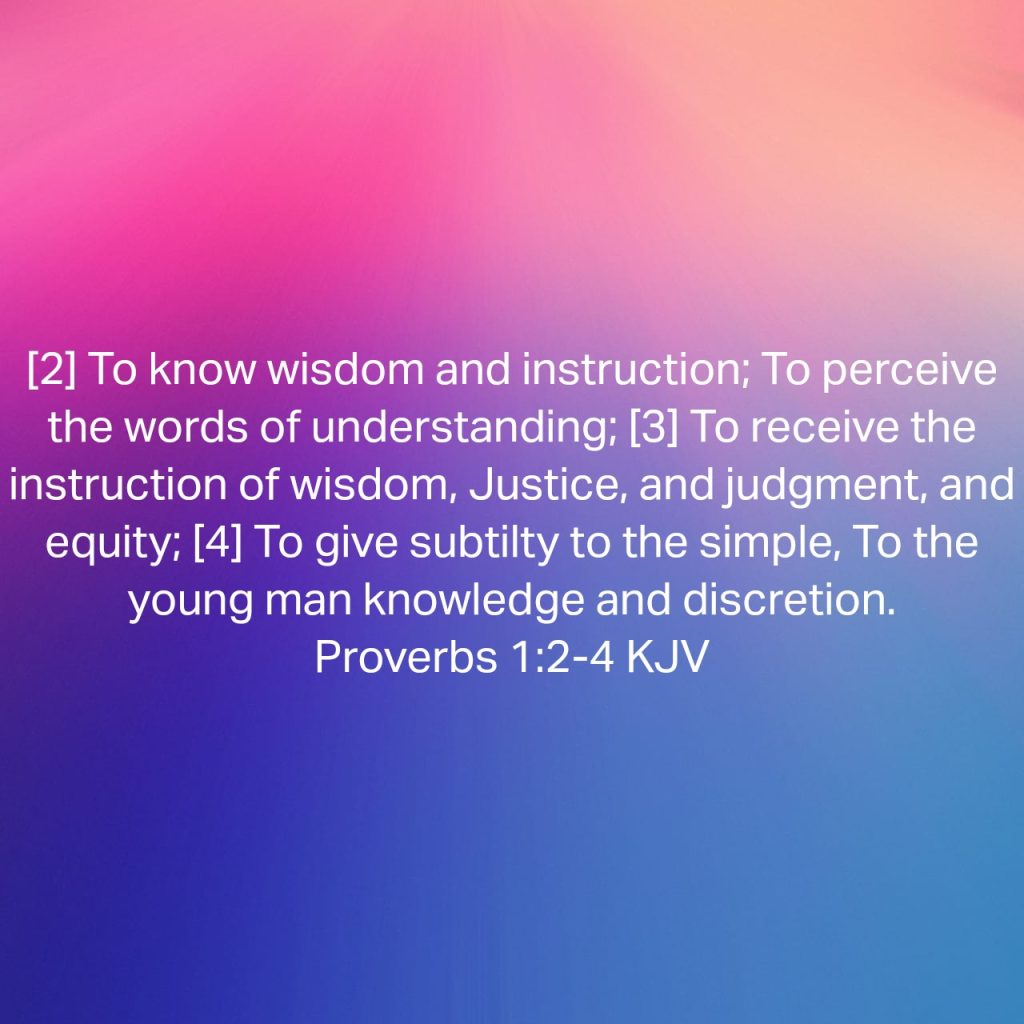The term “epistemology” comes from the Greek words “ἐπιστήμη” (epistēmē), meaning “knowledge,” and “λόγος” (logos), meaning “study” or “discourse.” Here’s a detailed chronological breakdown: 1. Proto-Indo-European (PIE) The PIE root “*weid-” means “to see” or “to know.” 2. Ancient Greek From the PIE root, the Ancient Greek word “ἐπίσταμαι” (epistamai) developed, meaning “to know.” The noun “ἐπιστήμη” (epistēmē) means “knowledge” or “understanding.” The word “λόγος” (logos) means “study,” “discourse,” or “reason.” 3. Late Latin The Greek terms “ἐπιστήμη” (epistēmē) and “λόγος” (logos) were adopted into Late Latin as “episteme” and “logos,” respectively, maintaining their meanings. 4. Middle English (c. 11th to 15th century CE) The Latin terms influenced Middle English,… Read More
Continue Reading
Proverbs 1:2-4 (KJV)
“[2] To know wisdom and instruction; to perceive the words of understanding; [3] To receive the instruction of wisdom, justice, and judgment, and equity; [4] To give subtilty to the simple, to the young man knowledge and discretion.” Read more here. Introduction Proverbs 1:2-4 outlines the purpose of the Book of Proverbs, emphasizing the acquisition of wisdom, understanding, and instruction in various virtues. Interpretation These verses highlight the goals of gaining wisdom, understanding insightful words, and receiving instruction in wisdom, justice, judgment, and equity. They aim to provide subtlety to the inexperienced and impart knowledge and discretion to the young. Modern Day Application Across Various Fields 1. Theology Encourages the… Read More
Continue Reading
Proverbs 1:5-6 (KJV)
“[5] A wise man will hear, and will increase learning; and a man of understanding shall attain unto wise counsels: [6] To understand a proverb, and the interpretation; the words of the wise, and their dark sayings.” Read more here. Introduction Proverbs 1:5-6 emphasizes the value of wisdom and understanding, highlighting the importance of learning and seeking wise counsel. Interpretation These verses suggest that wise individuals are open to learning and continuously seek to expand their knowledge. Understanding proverbs and wise sayings involves not just hearing but also interpreting and applying their deeper meanings. Modern Day Application Across Various Fields 1. Education Promotes lifelong learning and the pursuit of knowledge,… Read More
Continue ReadingEtymology of the Word “Understanding”
Contextual Usage The word “understanding” comes from the Old English “understandan,” which means “to comprehend” or “to grasp the idea of.” It combines “under,” used in the sense of “among” or “between,” and “standan,” meaning “to stand.” Thus, “understanding” originally conveyed the idea of standing in the midst of or among something to grasp its meaning. Historical Usage Modern Usage Across Disciplines Cultural Perspectives Understanding in Modern Context Today, “understanding” is broadly used to describe the ability to comprehend and make sense of ideas, situations, and emotions, crucial for effective learning, communication, and empathy.
Continue ReadingEtymology of the Word “Knowledge”
Contextual Usage The word “knowledge” in English derives from the Old English “cnāwan,” meaning “to know,” combined with the suffix “-leċe” or “-leċ,” which indicates an abstract noun. Its roots trace back to the Proto-Germanic “knew-” and the Proto-Indo-European root “ǵneh₃-,” which also means “to know.” Historical Usage Modern Usage Across Disciplines Cultural Perspectives Knowledge in Modern Context Today, “knowledge” is understood as the sum of what is known, encompassing information, skills, and understanding gained through education and experience.
Continue Reading
Proverbs 1:2-4 (KJV)
“[2] To know wisdom and instruction; to perceive the words of understanding; [3] To receive the instruction of wisdom, justice, and judgment, and equity; [4] To give subtilty to the simple, to the young man knowledge and discretion.” Read more here. Introduction Proverbs 1:2-4 introduces the purpose of the Book of Proverbs, outlining its goals of imparting wisdom, instruction, and understanding. Interpretation These verses emphasize the value of wisdom and instruction for living a just and equitable life. They highlight the importance of understanding, discernment, and knowledge, especially for the young and inexperienced. Modern Day Application Across Various Fields 1. Education Stresses the importance of lifelong learning and acquiring knowledge,… Read More
Continue Reading